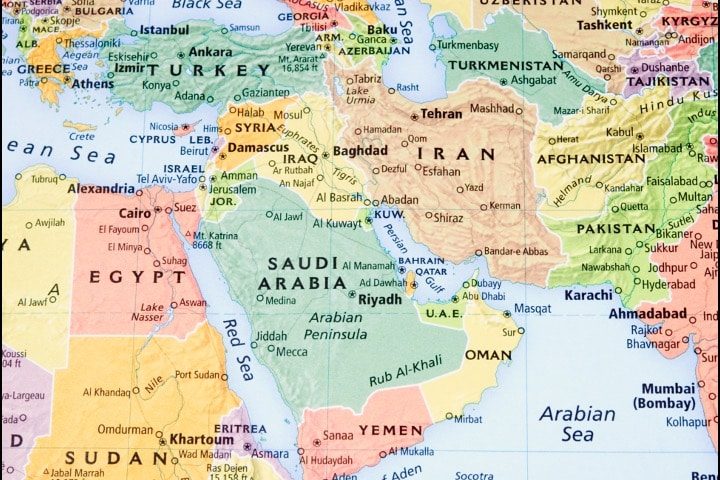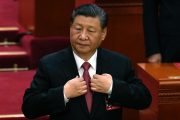
SINGAPORE — The government in Damascus should reinstate the rule of law in all of Syria’s territory, while foreign armed groups should pull out of the country, according to statements made by the foreign ministers of Syria, Saudi Arabia, Jordan, Egypt, and Iraq.
Before the multilateral meeting, Syrian Foreign Minister Faisal Mekdad met his Jordanian counterpart, Ayman Safadi, to discuss border security, refugees, and “water issues,” Amman media reported.
During the meeting, Saudi Arabia, Egypt, Jordan, and Iraq vowed to reinstate relations with the Syrian military and security institutions to “address security challenges.” All five ministers called to end “foreign interference in Syrian domestic affairs” and the creation of technical teams of specialists that would enforce measures to address the conflict in Syria.
State news agencies published a joint statement from the five ministers advocating for “ending the presence of terrorist organizations” and “armed groups” in Syria, and “neutralizing their ability to threaten regional and international security.” Moreover, the ministers promised to “support Syria and its institutions to establish control over all of its territory and impose the rule of law.”
The Amman meeting on May 1 came only weeks after Mekdad visited Saudi Arabia and obtained the latter’s support for Syria’s territorial integrity. At the moment, Turkish-backed militants dominate parts of northern Syria, while American-backed Kurdish militias control the Syrian northeast. Hundreds of American soldiers are in Syria overseeing most of the country’s oil wells.
Britain-based journalist and political analyst Robert Inlakesh remarked to Western-sanctioned media news outlet Russia Today that under the administration of U.S. President Joe Biden, Western nations’ clout among various long-standing Middle Eastern allies has taken a nosedive.
The analyst then posited that the U.S.-led Western alliance has been focused on aiding Ukraine in its conflict with Russia to the detriment of its foreign policy decisions in the Middle East. For example, the recent Chinese-brokered deal in facilitating a rapprochement of ties between Iran and Saudi Arabia dealt a major blow to Washington’s power in the region, such as American plans to group the Saudis with the UAE, Egypt, Jordan, Bahrain, and Israel to counter Iran and its allies, possibly functioning as a “Middle East NATO.” Following China’s mediating role in the Saudi-Iranian reconciliation, both Riyadh and Tehran reportedly hope to open embassies in each other’s countries.
In April, CIA Director William Burns told Saudi officials that America did not expect a Saudi-Iranian reconciliation brokered by China, based on reports from The Wall Street Journal (WSJ).
Various anonymous sources told the WSJ that Burns “expressed frustration” with Riyadh and said Washington “felt blindsided” by its renewed diplomacy with both Iran and Syria.
Another setback for the Biden administration as a result of the Iran-Saudi détente has been Riyadh’s current abandonment of plans to reinstate relations with Israel, a reinstatement which would have been touted as a foreign policy achievement for the Biden administration. Additionally, Saudi Crown Prince Mohammed bin Salman said in March this year that he did not care about Biden’s opinion of him and that pleasing America was no longer a priority.
Ongoing tensions between Biden and Israel’s Benjamin Netanyahu have also cast aspersions on long-time special bilateral ties between Israel and the United States. In March this year, Netanyahu replied to Biden’s voiced worries about proposed judicial reforms in Israel, maintaining that Israel would make its own decisions and not cave in to “pressure from abroad.”Netanyahu also told Washington not to interfere in his country’s domestic affairs.
Meanwhile, China’s Foreign Minister Qin Gang’s recent suggestion to his Palestinian Authority and Israeli counterparts that Beijing could facilitate bilateral talks could be perceived as another Chinese snub on American policymakers.
Rubbing salt into the wound for America, Saudi Arabia’s foreign minister recently visited Damascus to meet with Syrian President Bashar al-Assad, amid calls for Syria to be re-integrated into the Arab League, contradicting the American agenda.
Iranian president Ebrahim Raisi also announced plans to visit Damascus this week for talks, marking a “turning point” in regional relations. He would be the first Iranian head-of-state to visit Syria in over ten years.
Raisi’s upcoming two-day trip to Damascus seeks to boost relations between nations that oppose Western global dominance, Ambassador Hossein Akbari declared on April 30 to Iran’s state-run IRNA news agency, seemingly referring to America’s foreign policy. “This trip will not only be beneficial for Tehran and Damascus, but it is a very good event that other countries in the region can also take advantage of,” the diplomat stated.
The timing of the visit makes it all the more crucial due to ongoing regional developments, Akbari added.
“This trip can open a space and chapter of interaction between the countries that oppose the domination system, especially the countries that are in the area of sanctions and have common interests,” Akbari said. “Other countries can also use it.”
Mohammad Jamshidi, Tehran’s deputy presidential chief of staff for political affairs, opined that Raisi’s trip would be a “celebration” for the “axis of resistance,” elaborating that “West Asia has undergone a tense period of geopolitical change with two results: victory of Iran and failure of the US.”
The last Iranian president to have visited Syria was Mahmoud Ahmadinejad, who visited Damascus in 2010.
The Syrian uprising can be said to have begun in 2011, when militants supported by Saudi Arabia and the United States launched an uprising against Syrian President Bashar Assad. A bloody war then ensued, costing the lives of hundreds of thousands of people and triggering a widespread refugee problem. Although Syria’s neighbors and regional powers have sought to bolster relations with Damascus in recent months, America has remained adamant about its policy of “regime change” in the country, a policy that the Deep State elites in Washington have also been promoting in other regions such as central and eastern Europe.



